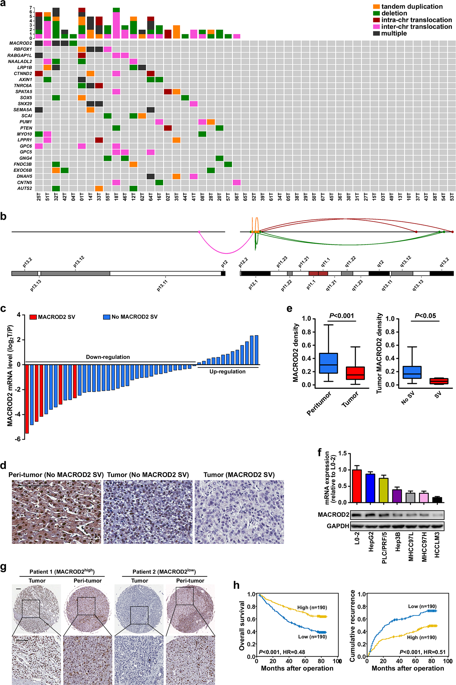npj Genomic Medicine ( IF 5.3 ) Pub Date : 2020-04-01 , DOI: 10.1038/s41525-020-0122-7 Zheng-Jun Zhou 1, 2 , Chu-Bin Luo 1, 2 , Hao-Yang Xin 1, 2 , Zhi-Qiang Hu 1, 2 , Gui-Qi Zhu 1, 2 , Jia Li 1, 2 , Shao-Lai Zhou 1, 2

|
Structural variations (SVs) influence the development and progression of multiple types of cancer. The genes affected by SVs in hepatocellular carcinoma (HCC) and their contribution to tumor growth and metastasis remain unknown. In this study, through whole-genome sequencing (WGS), we identified MACROD2 as the gene most frequently affected by SVs, which were associated with low MACROD2 expression levels. Low MACROD2 expression was predictive of tumor recurrence and poor overall survival. MACROD2 expression was decreased in HCC cell lines, especially those with high metastatic potential. MACROD2 knockdown in HCC cells markedly enhanced proliferation and invasiveness in vitro and tumor progression in vivo and promoted epithelial–mesenchymal transition (EMT). By contrast, MACROD2 overexpression reversed EMT and inhibited HCC growth and metastasis. Mechanistically, MACROD2 deficiency suppressed glycogen synthase kinase-3β (GSK-3β) activity and activated β-catenin signaling, which mediated the effect of MACROD2 on HCC. In clinical HCC samples, decreased MACROD2 expression was correlated with the activation of GSK-3β/β-catenin signaling and the EMT phenotype. Overall, our results revealed that MACROD2 is frequently affected by SVs in HCC, and its deficiency promotes tumor growth and metastasis by activating GSK-3β/β-catenin signaling.
中文翻译:

MACROD2缺乏症通过激活GSK-3β/β-catenin信号传导促进肝癌的生长和转移
结构变异(SV)影响多种癌症的发展和进程。在肝细胞癌(HCC)中受SV影响的基因及其对肿瘤生长和转移的贡献仍然未知。在这项研究中,通过全基因组测序(WGS),我们鉴定了MACROD2是最常受SV影响的基因,而SV与低MACROD2表达水平有关。低MACROD2表达可预示肿瘤复发和较差的总体生存率。在HCC细胞系中,尤其是具有高转移潜能的细胞系中,MACROD2表达降低。HCC细胞中的MACROD2敲低显着增强了体外增殖和侵袭性以及体内肿瘤的进展,并促进了上皮-间质转化(EMT)。相比之下,MACROD2过表达逆转了EMT并抑制了HCC的生长和转移。机械上,MACROD2缺乏抑制糖原合酶激酶3β(GSK-3β)活性并激活β-catenin信号传导,这介导了MACROD2对肝癌的影响。在临床HCC样本中,降低的MACROD2表达与GSK-3β/β-catenin信号转导和EMT表型相关。总的来说,我们的结果表明,MACROD2在肝癌中经常受到SV的影响,其缺乏通过激活GSK-3β/β-catenin信号传导促进肿瘤生长和转移。



























 京公网安备 11010802027423号
京公网安备 11010802027423号